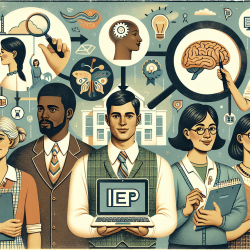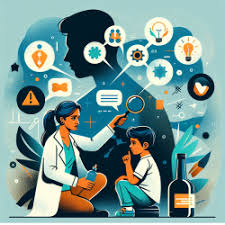Introduction
In the realm of speech-language pathology, integrating research findings into practice is crucial for enhancing therapeutic outcomes. A recent study titled "Using co-creation focus groups to customise a remote multidomain programme designed to increase dementia literacy" offers valuable insights into the application of co-creation methodologies in developing effective educational programs. This blog post explores how practitioners can leverage these findings to improve their skills and outcomes in speech-language pathology, particularly in online therapy services for children.
Understanding Co-Creation
Co-creation involves collaboration between researchers, practitioners, and stakeholders, including those with lived experiences, to design and implement programs that are relevant and effective. This approach ensures that the content and delivery of educational materials meet the needs of the target population, leading to better engagement and outcomes.
Key Findings from the Study
The study utilized five qualitative co-creation focus group sessions to adapt the Brain Health PRO program for increasing dementia literacy. The focus was on usability, accessibility, and engagement, which are crucial factors in any educational program. The findings highlighted the importance of:
- Diversity in content and presentation styles to cater to a wide audience.
- Refinement of web interfaces to enhance user experience.
- Engagement strategies to improve participant recruitment and retention.
Implications for Practitioners
Practitioners in speech-language pathology can apply these insights to enhance their online therapy services. Here are some practical steps:
- Incorporate Diverse Content: Ensure that therapy materials reflect diverse cultural and linguistic backgrounds, making them more relatable and engaging for children from various communities.
- Enhance User Experience: Simplify the user interface of online therapy platforms to make them more accessible to children and caregivers, ensuring ease of navigation and interaction.
- Engage Stakeholders: Involve caregivers and educators in the development of therapy programs to tailor content that meets the specific needs of children, thereby improving engagement and outcomes.
Encouraging Further Research
While the study provides valuable insights, further research is essential to explore the application of co-creation in different contexts within speech-language pathology. Practitioners are encouraged to engage in collaborative research efforts to continue improving therapy outcomes for children.
Conclusion
By integrating co-creation methodologies into practice, speech-language pathologists can enhance the effectiveness of their therapy programs, particularly in online settings. This approach not only improves engagement and outcomes but also fosters a collaborative environment that benefits all stakeholders involved.
To read the original research paper, please follow this link: Using co-creation focus groups to customise a remote multidomain programme designed to increase dementia literacy.










